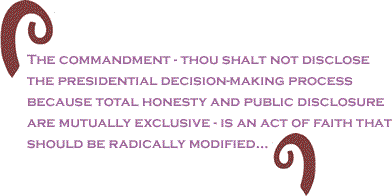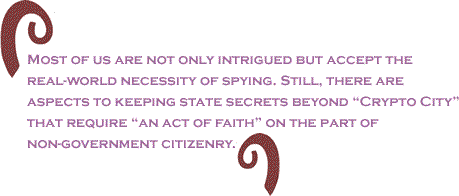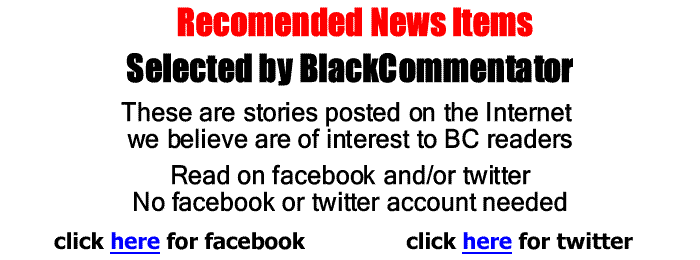The
largest body of secrets are not contained at CIA headquarters in
Langley, Virginia but about 30 miles up I-95 near Annapolis Junction,
Maryland.
Just off the Baltimore-Washington Parkway there�s a specially-built
exit ramp that leads to �Crypto City� �- a super-secret no-man�s
land that also houses one of the largest collections of super-calculating
computers. And with 60 or so office buildings, warehouses, factories,
labs and living quarters, the �city� employs tens of thousands of
advanced mathematicians, linguists, computer geeks, military personnel
and other assorted spooks who work in utter anonymity.
It may sound like a mysteriously interesting place to visit and
maybe snap a few pictures but you wouldn�t want to do that because
you�d be in violation of the Internal Security Act and have more
9mm submachine gun-packing security on you than flies at a horse
stable, asking questions like: �Don�t you see those bright yellow
signs that say no photos, cameras or note-taking in this area?�
This is the National Security Agency but if you ask the men in black
what NSA stands for they�ll tell you those letters stand for �No
Such Agency� exists.
In his best-selling book Body
of Secrets: Anatomy of the Ultra-Secret National Security Agency , James Bamford reports that the very first subject addressed
in the NSA Handbook is
the �practice of anonymity.� Even those seeking employment with
the NSA are told very little about the work of the world�s largest
espionage agency, to the point where it �can have an adverse effect
on recruitment.� , James Bamford reports that the very first subject addressed
in the NSA Handbook is
the �practice of anonymity.� Even those seeking employment with
the NSA are told very little about the work of the world�s largest
espionage agency, to the point where it �can have an adverse effect
on recruitment.�
�Indeed, so little can be said that the acceptance of employment
with NSA is virtually an act of faith,� in the words of an NSA
Technical Journal editorial.
Most of us are not only intrigued but accept the real-world necessity
of spying. Still, there are aspects to keeping state secrets beyond
�Crypto City� that require �an act of faith� on the part of non-government
citizenry. Question is: do the pillars of the secrecy faith serve
us, we the people, well?
As Steven Aftergood of the Federation of American Scientists reports,
one pillar of the faith is enshrouded in the 1974 Supreme Court
ruling United States v.
Nixon. Even though the Supremes
ordered the Nixon White House to comply  with
a subpoena for the Watergate tapes, they also affirmed that secrecy
is a vital part of presidential deliberations because it promotes
greater candor, which lead to better policy outcomes. with
a subpoena for the Watergate tapes, they also affirmed that secrecy
is a vital part of presidential deliberations because it promotes
greater candor, which lead to better policy outcomes.
In the words of the Court: �A President and those who assist him
must be free to explore alternatives in the process of shaping policies
and making decisions and to do so in a way many would be unwilling
to express except privately.�
The commandment - thou shalt not disclose the presidential decision-making
process because total honesty and public disclosure are mutually
exclusive - is an act of faith that should be radically modified,
according to a new law review published in the Spring volume of
the George Mason Law
Review getting some
attention in policy wonk circles.
The standard view is that in private people are more willing to
discuss doubts, express emotion or debate controversial options.
But, according to the trio of scholars who wrote the review, the
standard view is �a highly contestable view of human nature� with
little empirical evidence to back it up. More importantly, the authors
argue, these assumptions about candor and secrecy don�t take into
account the downside of it all.
In practice, the review notes, official secrecy can serve to discourage
honest deliberation. The paper cites numerous times when Bush Administration
advisors declined to question confidential policy pronouncements,
even when they harbored serious doubts.
Not only can secrecy discourage truth-telling, the author�s say,
it�s also not a necessary condition for candor. For example, the
review notes, Congress almost never invokes its Constitutional right
to hold secret deliberations, demonstrating that candor and openness
are not mutually exclusive.
Finally, the author�s contend, candor-in-secret does not necessarily
lead to good decisions. �In many of the contexts in which candor
is used as a justification for secrecy, the candor that is being
shielded is candor that disserves the public interest.�
The paper emphasizes that the authors do not oppose all secret deliberations,
nor are they arguing that every official meeting be on C-Span. What
they are advocating is that the presumption of secrecy held in the Nixon Supreme Court
ruling is unjustified in both principle and practice, and that it
should be replaced by a general presumption of openness and disclosure,
especially Congress is asking for access to executive branch records.
�The presumption established by the Nixon Court...gives
presidents and their advisors reason to believe that secrecy is
standard operating procedure.�

�Dismantling
the Nixon canon
� as this Article advocates � would instead foster a culture where
the expectations were reversed, where ideas about what is appropriate
for public discussion are expanded, and where secrecy must be justified
by a risk of significant harm � not harm to the political prospects
of the incumbent officials, but to the interests of the nation as
a whole.�
Heresy!
This week, the conservative Hudson Institute is hosting a gathering
of the faithful to discuss Gabriel Schoenfield�s new book Necessary
Secrets: National Security, the Media, and the Rule of Law , in which he argues
that law enforcement needs to crackdown on leaks of classified intel
to reporters, often the only way the public comes to learn about
how its government operates at the highest level.
, in which he argues
that law enforcement needs to crackdown on leaks of classified intel
to reporters, often the only way the public comes to learn about
how its government operates at the highest level.
Heresy and faith go together like fried clams and tarter sauce.
The French poet Andre Suares was right. �It is faith that begats
heretics. There are no heresies in a dead religion.�
Count me among the heretics on this one.
BlackCommentator.com
Guest Commentator Sean Gonsalves is a longtime syndicated columnist,
formerly with Universal Press Syndicate, his work has appeared in
the Oakland Tribune, Boston Globe, USA Today, The Washington Post,
Huffington Post, Alternet, Common Dreams and ZNet. Gonsalves is
currently a news editor with the Cape Cod Times in Hyannis, MA,
where he lives with his wife and three children. Click here
to contact Mr. Gonsalves. |





















































